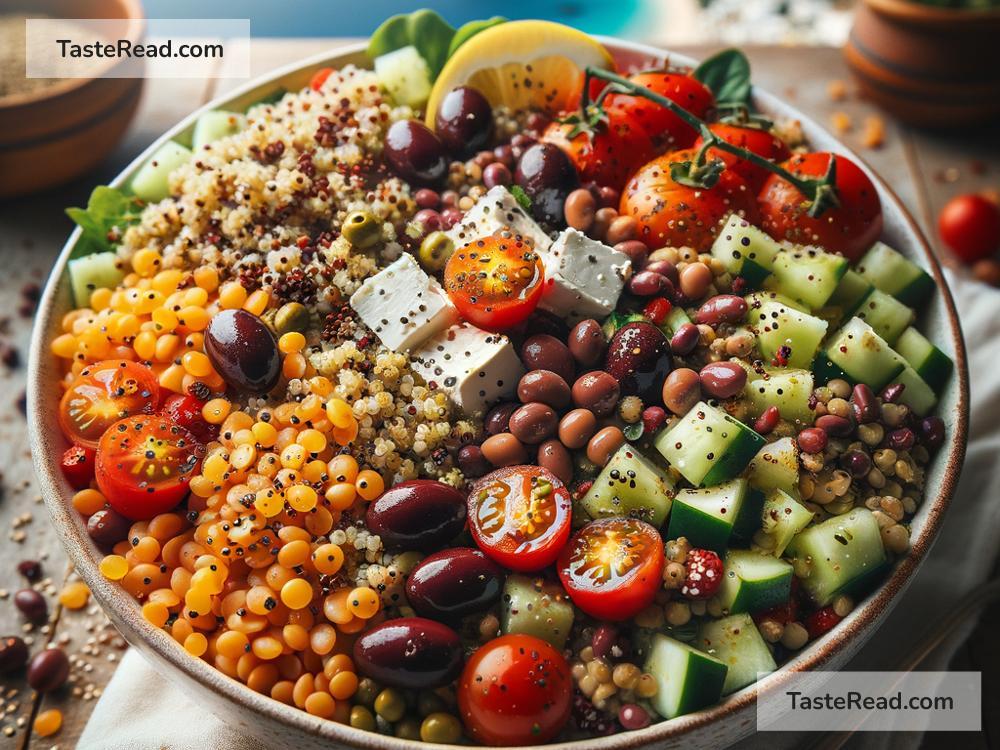Exploring Wholesome Multi-Grain Salad Enhancements in Mediterranean Diets in Greece
When people visit Greece, they often notice how fresh and healthy the food is. The Mediterranean Diet is famous for its incredible mix of flavors, healthy ingredients, and focus on fresh vegetables, fruits, and grains. One delightful aspect of this diet is the multi-grain salads, which not only taste great but are also beneficial for your health. Let’s explore how these salads are enhanced in Greece with fresh ingredients, traditional methods, and a wholesome approach to eating.
What is the Mediterranean Diet?
The Mediterranean Diet is based on the traditional way people eat in Mediterranean countries like Greece, Italy, and Spain. It’s not about counting calories or avoiding carbs. Instead, it focuses on eating natural, whole foods that fuel the body and mind. Typical components include olive oil, fresh vegetables, fruits, whole grains, nuts, seeds, legumes, fish, and moderate amounts of dairy and wine.
This diet is loved because it makes healthy eating simple, colorful, and delicious. It’s also linked to living a longer life and reducing the risk of heart disease, diabetes, and other chronic illnesses. At the heart of this diet in Greece are fresh salads, often made using nourishing multi-grain bases.
Multi-Grain Salads: A Greek Staple
Greek multi-grain salads take something as healthy and simple as grains and turn them into meals bursting with flavor. These salads often include grains like bulgur, quinoa, barley, or farro. They are mixed with fresh herbs, crunchy vegetables, olive oil, and tangy dressings to make them lighter yet satisfying.
One popular dish is tabbouleh, which uses bulgur wheat combined with parsley, mint, fresh tomatoes, and a zest of lemon. In Greece, chefs often add regional twists using local vegetables such as cucumber or bell peppers and top the salad with crumbled feta cheese or olives.
Why Multi-Grain Salads Are So Wholesome
Multi-grain salads are excellent for health because grains are rich in fiber. Fiber helps your digestion and keeps you feeling full for longer. Whole grains also provide important nutrients, like B vitamins, iron, magnesium, and antioxidants.
On top of that, salads are full of colorful, fresh vegetables that add vitamins and minerals, helping your body fight inflammation and stay strong. Olive oil ties it all together with healthy fats that support brain and heart health.
From a cultural perspective, Greek salads remind us that eating doesn’t have to be complicated. A simple recipe with fresh, high-quality ingredients is enough to create something nourishing and delicious.
How Greeks Enhance Their Multi-Grain Salads
You may be wondering what makes Greek multi-grain salads unique. The answer lies in the little touches added to the dishes! Greeks have perfected the art of elevating basic salads with a mix of ingredients, techniques, and fresh produce. Let’s explore some common enhancements.
1. Extra Virgin Olive Oil
Greece is famous for its olive oil, which is considered one of the best in the world. Greeks drizzle generous amounts of extra virgin olive oil over their salads. This not only adds flavor but also packs the dish with healthy fats and antioxidants.
2. Fresh Herbs
Herbs like oregano, dill, parsley, mint, and thyme are staples in Greek cooking. These herbs are often finely chopped and added to salads, giving them a fresh and aromatic twist. They are also known for their anti-inflammatory and digestion-boosting properties.
3. Feta Cheese
Feta cheese is a famous Greek ingredient found in many salads. Adding a small amount of crumbled feta gives salads a salty, creamy flavor that pairs beautifully with grains and vegetables.
4. Seasonal Vegetables
In Greece, using seasonal vegetables is essential. You’ll often find tomatoes, cucumbers, bell peppers, onions, and greens that are freshly picked and full of flavor. Eating seasonal produce ensures you’re getting the best nutrients at the peak of freshness.
5. Nuts and Seeds
Another common enhancement is adding nuts and seeds like almonds, walnuts, sunflower seeds, or sesame seeds. These provide crunch and are a healthy source of protein and fats.
6. Zesty Dressings
Greeks love zesty salad dressings made with lemon juice, vinegar, or a blend of spices. These dressings brighten the flavors of salads and take them to the next level.
Making Your Own Greek-Inspired Multi-Grain Salad
No trip to Greece required! You can easily make a Greek multi-grain salad at home. Start by cooking a grain, like quinoa or bulgur, as your base. Add fresh vegetables like tomatoes, cucumbers, and parsley. Then toss in some olives, crumbled feta cheese, and a handful of sunflower seeds for crunch. Finish with a dressing made of extra virgin olive oil, lemon juice, and a pinch of salt.
This salad is perfect as a light lunch or side dish. It’s quick to prepare, provides essential nutrients, and keeps you feeling full and energized throughout the day.
Conclusion
Multi-grain salads are a fantastic example of how Greeks embrace simplicity, freshness, and healthfulness in their Mediterranean Diet. By enhancing their salads with extra virgin olive oil, fresh herbs, seasonal vegetables, and ingredients like feta cheese, they create meals that are both tasty and nutritious.
Whether you’re visiting Greece or making your own Greek-inspired dish at home, exploring multi-grain salads is a delicious way to enjoy healthier eating. So grab some fresh grains, vegetables, and olive oil, and create a wholesome Greek dish that will make you feel good inside and out!


